Buenos Aires is Evo Morales’ own version of Puerta de Hierro, Juan Domingo Perón’s home in exile in Madrid.
Dozens of officials from his Movement for Socialism (MAS) party, unionists and social movement leaders meet with him every day to outline the political strategy for Bolivia’s upcoming presidential elections on May 3.
In those summits, they discuss candidates for the presidential ticket. A name which will be announced January 19. Three days later, on the 22, they will launch the party’s campaign with a mass rally — the first since Morales was deposed last year on November 10 by a military-backed coup — at Deportivo Español in Bajo Flores, where 15,000 people are expected to attend the announcement of the presidential ticket.
Used to little sleep and waking up early, Evo starts his days at five in the morning, the way he did in Bolivia. The offices he has in Buenos Aires open at 8am though, so the first meetings are at his house in the Bauen Hotel, an improvised Palacio del Quemado on Avenida Callao.
Twenty minutes past 10, Morales arrives at Isla Maciel, a neighbourhood in the docks of Avellaneda, in a modest, blue Fiat Siena. Neighbours jostle at the doors of the Fundación Isla Maciel, located at Las Heras 249.
“I’m proud that the president is in my neighbourhood,” says Freddy, a Bolivian who has lived in the area since 1991. He wears a grey shirt and, with a scarf wrapped around his shoulders with the colours of both Bolivia and Argentina, waits patiently with his family in the patio.
THE TOUR
White barriers are set up to separate the former president from the crowd. Take them away, say his team, who knows that he feels at ease being in touch with the people. Tens of neighbourhood Bolivians jostle to see Morales, to take a picture with him or ask him to sign a flag.
Juana is one of them. She said that she hasn’t visited her country in six years, but that she’s in constant contact with her family. “Evo did so much. He gave my sister a finished house,” she said, complimenting the president while surrounded by her daughter and friends.
Morales is facing a major political challenge. A refugee in Argentina after a brief stay in Mexico, indicted by the prosecutor’s office for “sedition” and “terrorism,” following a complaint by Jeanine Áñez’s de facto government, he is now designing a strategy for the “Democratic and Cultural Revolution,” as he calls his administration, to return to power. For that, he knows that the core voters who support him will not be enough. He will need to convince the urban middle class. This thesis swirls around his head as they debate names for the presidential ticket.
Morales is showered by applause from his followers as he walks, and they cry out when they notice bodyguards forming a human chain around him. Photographers bump into security forces and onlookers.
“Evo querido el pueblo está contigo [“Dear Evo, the people are with you”],” comes the chorus, which Morales answers with a raised arm. The barriers don’t hold back the press, which joins the human tide that pushes the MAS leader to the centre of the room.
The heat is suffocating. A young man swings, hanging outside on the window spikes. He doesn’t want to miss a single detail. Two videos are projected on a gigantic screen. The achievements of the MAS administrations earn applause. When an image of Áñez appears, boos rain down. “One can never trample on the people in the name of God,” declares Father Francisco ‘Paco’ Oliveira, the host of the event.
One hour earlier, Evo was meeting with the Grupo de Curas en Opción por los Pobres. Water, mate, a pastafrola de membrill and an orange juice for Morales, who has a cold, liven the conversation. Cackles resound through the windows, where curious onlookers peer in to take pictures or listen to the conversation.
“We reject the use of religious instruments to carry out the coup,” says Bishop Eduardo de la Serna. The introduction of a Bible to the Palacio del Quemado in the hands of Luis Fernando Camacho and the justification for the coup by the Bolivian Episcopal Conference have left an open wound among the priests that welcome Evo.
“The only thing that God will ask us on the day we meet with him is what you did for your poorest brothers,” Oliveira assures those gathered. “And what does the Church say?” said a woman from the crowd, annoyed. The priest doesn’t hear her and continues. “And what Evo Morales did with our most poor brothers is give them dignity. That’s why they gave him a military coup.”
The presentation could not have been more emphatic. The deafening noise, the shouts, singing and applause, die down when their hero takes the microphone. He highlights the most impressive numbers of his economic policy and explains the secrets of his government. “We only did three things; politically, we re-founded Bolivia; economically, we nationalised our natural resources and strategic companies; and socially, we redistributed wealth.”
“The people’s money should return to the people,” he insists, becoming a little preachy.
A local invites him to “play a little match” of football. “We’ll beat you 10-1,” says Morales, accepting with a smile.
ANNOUNCEMENT
Raising his voice to indicate that he is going to say something important, he announces his first political event in Buenos Aires.
“After consulting brother President Alberto Fernández, the Argentine government has allowed us to celebrate Bolivia’s Plurinational State Day, here in Argentina, on January 22. We will be meeting at Deportivo Español. It may be the first declaration from the candidate in Buenos Aires.”
The date is significant. It should have been the final one of his third consecutive presidential term.
Evo refers to Áñez, Camacho and Carlos Mesa as golpistas, coup-mongers, but promises that if MAS wins, there will be no vindictiveness. “We will not seek violent revenge, but try to regain awareness with the people’s vote in the next election.”
Flanked by Oliveira and the Cabinet Chief of the Mayor of Avellaneda, Jorge Ferraresi, Morales gives out gifts to the children in the community. “Better than the Three Kings,” nods Father Paco.
Analía, an 11-year-old girl, takes the microphone and reads out a message for the leader. “When my parents told me you’d be coming, I went crazy. I’ve always wanted to meet you,” she said. “I hope you come back to Isla Maciel. Thank you for giving Bolivians back their pride.”
The toys leave in the hands of their little owners. Security creates another corridor and Evo walks, posing for photos, greeting his followers. It’s time for lunch and a spicy chicken awaits the president. “So he sees that we don’t forget our roots,” says one of the cooks, who also prepared chicha de maíz and chicha de maní.
Evo is playing at home in Isla Maciel, which for one morning is dressed with the colours of the Bolivian flag and the whipala indigenous flag.
He works to make sure that Buenos Aires, like Puerta de Hierro for Perón, is the last destination of his exile.












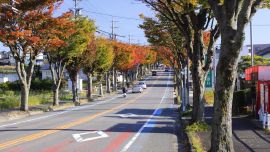


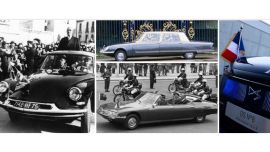




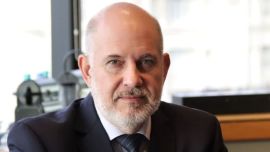
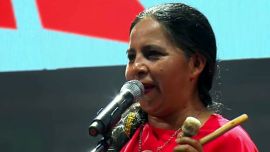
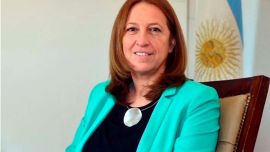
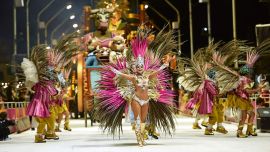
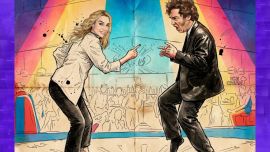
Comments